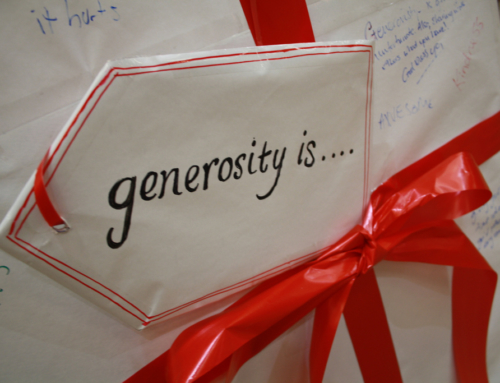October 3, 2016
By Phil Maynard
I have worked with a surprising number of churches recently that have expressed a need to help their members and friends learn how to build relationships. This is, of course, a foundational practice in the church, because . . .
• First time guests are much more likely to feel welcome if worship participants engage them in conversation and begin to build a relationship.
• Making disciples most often begins with a conversation leading to a relationship, and then leading to a decision to begin the journey of discipleship.
• Members becoming engaged in the life and ministry of the congregation begin this connection through conversations, the building of strong relationships, and developing friendships.
• Those persons engaged through service by the congregation are much more likely to discover the love of Jesus as the people serving enter into conversations and develop relationships.
This practice of having conversations and building relationships is a big deal!
How do we really create a relationship? It is very useful to create a framework to help congregations make meaningful connections and build relationships that matter.
• First, we must catch each other’s attention. This may take the form of mentioning a family’s  children or appreciating a person’s attire, using the proximity of location as an in-road to begin a conversation or just mentioning that you don’t know them even though they are sitting next to you, and using that moment of humble confession as an entry into conversation.
children or appreciating a person’s attire, using the proximity of location as an in-road to begin a conversation or just mentioning that you don’t know them even though they are sitting next to you, and using that moment of humble confession as an entry into conversation.
• Once we have established each other’s preliminary attention, we need to establish an interest in having a deeper conversation. The obvious interest for those already worshiping together would be their tenure at the church or involvement in church activities, or in the case of first-time guests, their experience of how they came to try this church. This movement of establishing an interest can include conversation around families, schools, sports, hobbies, or even favorite restaurants.
• There usually follows a period of exploration—a period of asking and answering each other questions, of probing for areas of common interest, of testing whether the other has anything to contribute to us, and whether we have anything to contribute to the other. The key here is learning to ask good questions. Be curious! With more people engaged in active and intentional relationship building, there is plenty of opportunity for people with common affinities or goals to get matched together. You don’t have to be EVERYBODY’s friend.
One way we explore our identities is sharing “our stories.” We have all grown up, encountered challenges large and small, and figured out what to do to move forward. And the ways we figure things out at these moments of choosing reveal the values and interests that matter most to us. Therefore, one of the most direct forms of exploration is to learn each other’s stories, focusing on these key choices. Why did you go to school here rather than there? Why did you study this rather than that? Why did you decide to emigrate rather than remain at home? And as we begin learning each other’s answers to these questions, we learn more about each other, what it is that moves us, and what it is we have experienced on our journey to this point that has uniquely prepared us to work with these people in this time and place.
• As a result of our exploration, we may begin to make exchanges—not just at some point in the future, but in the present, then and there within the conversation. We may turn out to be a good listener for someone who just needs an empathetic ear. We may find we are learning a great deal from our interaction with the other person. We may find we have an opportunity to offer another person some insight, support, or recognition that they find valuable. We may find we can challenge the other person in ways that may bring them new insight. We may also discover a basis for future “exchanges”—such as going to see a movie we both want to see, working on a service project together, deciding to come to an event or activity our new acquaintance has told us about, or just deciding to have another conversation and seeing what happens.
• Finally, if we’ve determined a basis may exist for the possibility of a deeper relationship to develop, we make a commitment to that potential relationship by agreeing to meet again, have coffee, come to the meeting, send emails, etc. What turns a relatively casual exchange into an actual relationship is the commitment we make to each other and to getting together for an extended period of time. Of course, the flip side of this is that people sometimes make the mistake of trying to go right to a commitment without laying a relational basis for it first (which can seem pushy or can just be a bad fit if there are no natural affinities on which to base the relationship).
Although most people recognize these suggestions as a natural progression from conversation to a richer relationship, there is a distinct difference between conversations and relationships that just happen by chance (which is the way most of us developed most of our friendships) and conversations and relationships that happen because we are being intentional in making them happen (which is what Jesus calls us to). Want to know more about how to help your congregation develop relationships that matter?
That’s why I’ve been working on the resource Connect! Creating a Culture of Relationships That Matter and its companion book, Connect! For Individuals and Small Groups. Click the links to discover a new and powerful resource to support your congregation in developing relationships inside and outside the church.
Click HERE to learn about how you can bring this powerful workshop to your area or your congregation. And, as always, we’d love for you to share your own experiences in the comment section!







Leave A Comment